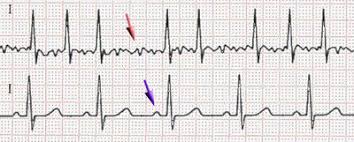
02 Feb USPSTF: Screening for Atrial Fibrillation in Adults over 50
MedicalResearch.com Interview with:

Dr. Ogedegbe
Gbenga Ogedegbe, MD, MPH
Dr. Adolph & Margaret Berger Professor of Population Health
Director, Division of Health & Behavior
Director Center for Healthful Behavior Change
Department of Population Health
NYU Langone Health
NYU School of Medicine
Member of the U.S. Preventive Services Task Force
MedicalResearch.com: What is the background for this study? What are the main findings?
Response: Atrial Fibrillation (AFib) is the most common type of irregular heartbeat and a major risk factor for stroke, and it often goes undetected. For this recommendation, the Task Force evaluated whether screening adults over the age of 50 who do not have any signs or symptoms of AFib can help prevent strokes.
In its evidence review, Task Force expanded its scope to include a search for studies on portable and wearable devices such as smartphones and fitness trackers in addition to electrocardiography (ECG). Despite this consideration, the Task Force found insufficient evidence to recommend for or against screening for AFib. This is consistent with the Task Force’s 2018 recommendation.
MedicalResearch.com: What should readers take away from your report?
Response: With new technologies emerging that may help with screening for AFib, the Task Force wanted to see what the new evidence tells us. After thoroughly reviewing the latest research, the Task Force issued an I statement. It’s important to note that an I statement is not a recommendation for or against screening for AFib. Rather, it’s a call for more research. In the absence of sufficient evidence, clinicians should use their best medical judgment to determine whether or not to screen any given patient for AFib.
MedicalResearch.com: What recommendations do you have for future research as a result of this work?

One example of Atrial Fibrillation; Wikipedia image
Response: The Task Force is specifically calling for more studies that compare the benefits and harms of screening for Afib against routine medical care. This will help determine whether or not screening helps prevent strokes. It is important that these trials reflect the U.S. population, including diverse representation across sex, race, and ethnicity.
Additionally, more research is needed on how to improve the accuracy of screening tests and strategies. We also need more research to understand whether or not AFib that is detected with a medical or consumer device, rather than through routine care, puts someone at increased risk for stroke.
MedicalResearch.com: Is there anything else you would like to add? Any disclosures?
Response: The Task Force always considers how our recommendations may help eliminate racial disparities in healthcare. However, the evidence is not clear if the prevalence of AFib differs by race and ethnicity. While some studies suggest that Black adults have the same or lower rates of AFib compared to White adults, they are at higher risk of stroke. Lower documented rates of AFib among Black adults may be driven in part by underrepresentation in research. Ultimately, the Task Force recognizes that more studies are needed with participants from diverse racial and ethnic groups.
Citations:
- US Preventive Services Task Force. Screening for Atrial Fibrillation: US Preventive Services Task Force Recommendation Statement. 2022;327(4):360–367. doi:10.1001/jama.2021.23732
- Gladstone DJ, Wachter R, Schmalstieg-Bahr K, et al. Screening for Atrial Fibrillation in the Older Population: A Randomized Clinical Trial. JAMA Cardiol.2021;6(5):558–567. doi:10.1001/jamacardio.2021.0038
[wysija_form id=”3″]
[last-modified]
The information on MedicalResearch.com is provided for educational purposes only, and is in no way intended to diagnose, cure, or treat any medical or other condition. Always seek the advice of your physician or other qualified health and ask your doctor any questions you may have regarding a medical condition. In addition to all other limitations and disclaimers in this agreement, service provider and its third party providers disclaim any liability or loss in connection with the content provided on this website.
Last Updated on February 2, 2022 by Marie Benz MD FAAD
